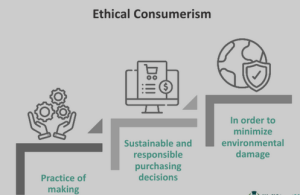Fair trade and ethical consumerism are concepts that advocate for fair and ethical practices in the production and trade of goods. These movements aim to promote social and environmental responsibility, improve labor conditions, and ensure fair compensation for producers. Here are key aspects of fair trade and ethical consumerism:

Fair Trade and Ethical Consumerism
Table of Contents
ToggleFair Trade:
- Fair Prices:
- Fair trade emphasizes fair prices for producers, ensuring that farmers and workers receive a reasonable income for their labor. This helps alleviate poverty in communities where goods are produced.
- Direct Trade:
- Fair trade often involves direct relationships between producers and buyers, eliminating unnecessary intermediaries. This transparency allows consumers to know the origin of the products they purchase.
- Labor Rights:
- Fair trade standards include respect for labor rights, such as the prohibition of child labor and the promotion of safe and healthy working conditions. Workers are entitled to fair wages and the right to organize.
- Environmental Sustainability:
- Fair trade promotes environmentally sustainable practices. Producers are encouraged to adopt eco-friendly farming methods, minimize the use of harmful chemicals, and implement sustainable agricultural practices.
- Community Development:
- Fair trade initiatives contribute to community development by investing in projects that benefit local communities. These projects may include education, healthcare, and infrastructure development.
- Gender Equality:
- Fair trade strives to promote gender equality by ensuring that women are treated fairly and have equal opportunities in the production and trade of goods.
- Certification and Labeling:
- Fair trade products are often certified by organizations that verify compliance with fair trade standards. Labels on products help consumers easily identify and support fair trade practices.
Ethical Consumerism:
- Conscious Purchasing:
- Ethical consumerism involves making conscious and informed purchasing decisions. Consumers consider the social, environmental, and ethical impact of the products they buy.
- Supporting Ethical Brands:
- Ethical consumers choose to support brands that demonstrate a commitment to ethical practices. This includes fair labor conditions, environmental sustainability, and responsible sourcing.
- Boycotting Unethical Practices:
- Ethical consumers may boycott products or companies that engage in unethical practices, such as exploitation of workers, environmental degradation, or violations of human rights.
- Demand for Transparency:
- Ethical consumers demand transparency from companies regarding their supply chains, labor practices, and environmental impact. They value open communication about the origin and production processes of goods.
- Promotion of Sustainable Products:
- Ethical consumers prioritize products that are produced sustainably and have minimal environmental impact. This includes considering factors such as packaging, resource use, and waste management.
- Advocacy and Awareness:
- Ethical consumers may engage in advocacy and awareness campaigns to promote ethical practices in the marketplace. They may raise awareness about issues such as fair wages, animal welfare, and environmental conservation.
- Educated Consumer Choices:
- Consumers educate themselves about the social and environmental implications of different products and make choices aligned with their values.
- Local and Artisanal Products:
- Ethical consumers may prefer to support local and artisanal products to reduce the environmental impact of long-distance transportation and to promote local economies.
- Cruelty-Free and Vegan Choices:
- Ethical consumers often choose products that are cruelty-free and vegan, avoiding items that involve harm to animals or contribute to environmental degradation.
- Circular Economy Practices:
- Ethical consumers may support companies that embrace circular economy practices, such as recycling, upcycling, and minimizing waste in the production process.
Both fair trade and ethical consumerism aim to create a more ethical and sustainable global marketplace. By supporting these practices, individuals can contribute to positive social and environmental change and encourage businesses to adopt responsible and ethical practices throughout their supply chains.
